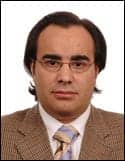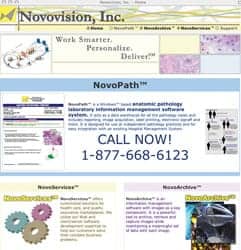An interview with Wally Soufi, CEO
 |
| Wally Soufi |
Novovision Inc was founded in 1993 as a company offering software consulting services to health care and quality assurance laboratories. The company began offering specialized products in 1999 with the launch of its flagship product, NovoPath, an anatomic pathology software system that aims to change the way labs are run in the 21st century. Wally Soufi, Novovision Inc’s CEO, has been with the company since the early stages of its formation. With a master’s degree in electrical engineering, Soufi wanted to become involved in the health care industry because he desired to put his engineering skills to use helping others.
CLP spoke to Soufi about Novovision Inc’s role in the market and where the industry is going.
CLP: Do you think NovoPath has had an impact on the way labs are run?
Soufi: I believe NovoPath made it possible for its laboratory clients to compete with, and win accounts from, larger laboratories by offering a better overall product while maintaining a higher level of service.
 |
CLP: Were there any bumps on the road to getting where you are today?
Soufi: A sizeable marketing and product-launch campaign was planned for NovoPath in September 2001. With the events of September 11, 2001, that campaign didn’t materialize, and our plans to move forward took a significant hit along with the rest of the country. It took about 18 months to get back the momentum we lost.
CLP: How receptive is the market to digitizing records?
Soufi: I think there is already a wide acceptance for maintaining digital records when it comes to patient care. Adoption, however, is another issue. The perceived cost of adopting a digital records system is still high, which creates resistance in the minds of the decision-makers.
CLP: Are the decision-makers remembering when digitization was first starting, or are they thinking of different companies and technologies when they think of high costs?
Soufi: The perception can be traced to the perceived need for a large amount of professional services to implement such solutions in addition to the two reasons you suggested.
CLP: What kinds of precautions are implemented against data loss and file corruption?
Soufi: The beauty of digital records is that they can be moved around easily and replicated, but without proper safeguards they can end up in the wrong hands. If data-storage equipment is maintained by experienced professionals and today’s industry-standard security practices are implemented, the likelihood of data loss, compromise, or file corruption is very low.
CLP: How would you alleviate a potential client’s concerns?
Soufi: I would recommend the use of proven methodologies and technologies that are in place today at financial and telecom companies. These companies have maintained a high standard of reliability and security when it comes to data storage. In addition, variations of these standards can now be implemented at reasonable costs.
CLP: How easy is it to implement NovoPath in a lab?
Soufi: The complexity of a NovoPath implementation will vary depending on the size of a lab. In its simplest form, a client runs a setup program and that’s it. However, the majority of our installations are done by our professional installers. In all cases, we follow a straightforward methodology that has worked well for us and our clients, and we continuously update this methodology for better results.
CLP: How are you differentiating yourself among your competitors?
Soufi: Novovision is offering solutions that add real efficiencies and cost savings into the workflow of an anatomic pathology lab. We believe the lab information system should help the lab’s bottom line rather than become another cost center. For example, instead of buying a digital scanning solution to store the digitized images of all the paperwork that an AP lab receives and pay a hefty sum of money for it, a client can add an optional NovoPath module—a batch document scanning module—which accomplishes the same task for a fraction of the cost of purchasing a standalone system, and without the double entry required to correlate scanned documents with lab information systems records.
CLP: What would you like to see Novovision do in the next 5 years?
Soufi: I would like Novovision to continue to work with our clients to offer software solutions that improve the overall quality of their service and to better serve all patients. I would also like to see us in a partnership with one of the national labs so that our ideas may have a wider impact.
CLP: Where do you see the market going?
Soufi: As an observer of the anatomic pathology market and from an information systems vendor point of view, I see significant improvements in the handling and delivery of medical specimens becoming reality to better guard both patient safety and confidentiality. I anticipate that the growth in new tests will also drive changes in lab workflow.
CLP: Do you see the health care industry going entirely paperless?
Soufi: I do. But it will take another generation for that to happen. Until the people who need health care services the most—the elderly—are comfortable with electronic everything, there will be a need for a paper handler.
CLP: If you could tell readers one thing about Novovision, what would it be?
Soufi: Novovision has a strong track record in offering innovative software solutions for anatomic pathology laboratories with an unparalleled level of personal service.
Zac Dillon is associate editor of Clinical Lab Products.


